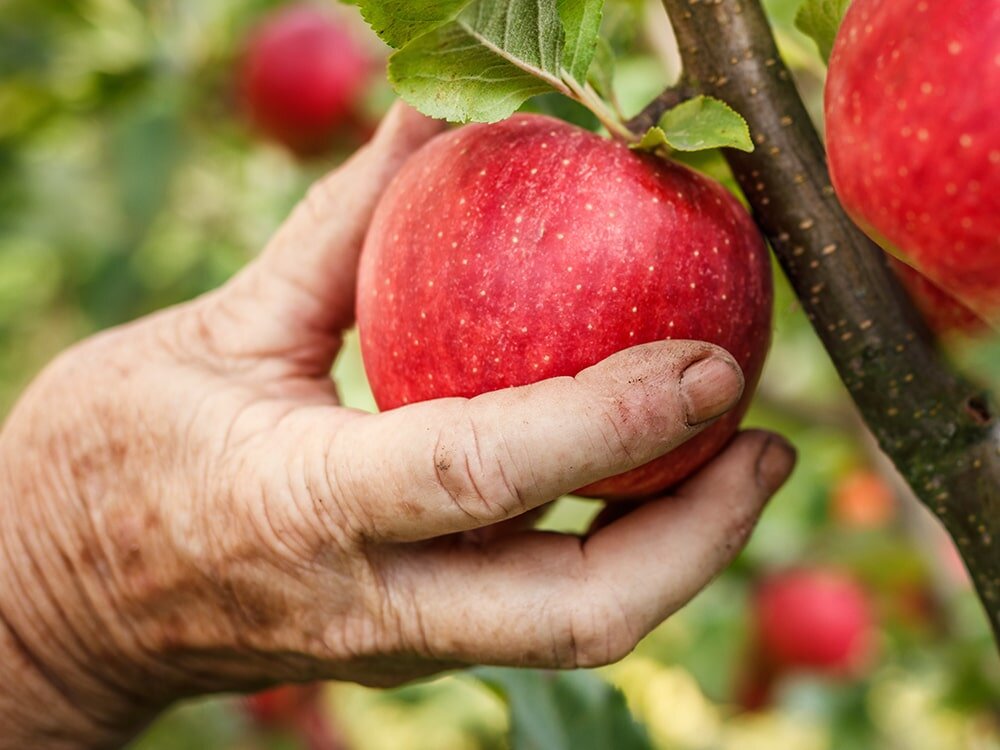Living in the Pacific Northwest, we have such an abundance of local and fresh fruit available, it is hard not to want to buy trees and grow your own. Driving around established neighborhoods, it is a common sight to see many of the older homes with large mature fruit trees, especially apple trees. If you are thinking of planting Wilco fruit tree or trees, here are some tips to consider. I always like to suggest that visiting with other gardeners and learning from them is an ideal way to gain information of the success and failure of others on growing specific fruit trees. Also, check with the local garden center specialist for more information for your area.


Size
Fruit trees should be considered a permanent part of the garden. They should be planted in a space where they can grow and thrive for many years. A standard size fruit tree is going to grow to be a large tree, just visit an orchard and you will see an example of this. A mature apple tree may reach 40 feet in height and equally as wide, and this limits them in many suburban gardens. Information on plant labels should give you information as to maximum height. For smaller size trees, consider those that are labeled as semi-dwarf or dwarf rootstock because this will limit the size of the tree. Once again, check the plant label because it will have this information. Need to tips on fitting in fruit trees? Read more here
Location
Most fruit trees are going to require being in a full sun location to perform their best. Without adequate sun, your tree may produce lots of leaves but little or no fruit. Sometimes gardens do not have adequate open spaces for fruit trees. If you have a wall or fence that receives lots of sun, consider espaliering fruit trees. With proper pruning, fruit trees can be trained to grow on a fence, wall, and even along wires. There will be more maintenance required, but it can be done and can be quite successful.
Soil
Trees need nutrients, just like we do. If they are going to grow and thrive, they are going to need the right soil conditions. Most fruit trees will not tolerate standing water and providing adequate drainage is essential. They are also going to need certain nutrients to grow and getting a Wilco Premium Soil Test Kit should be high on your list. Since the tree you plant is going to be a permanent part of the garden, it is necessary to know what nutrients, if any, need to be added to the soil. A soil test will provide this information and adding necessary nutrients at planting time is ideal.Pollination
Some fruit trees will need to be pollinated with another for fruit production. This is vital information because you may be able to grow a beautiful tree but have no fruit without it being pollinated.
What Kind of Tree
Be sure to select a tree that has fruit you enjoy eating! Depending on your skill level and the time you want to spend tending the trees, it might be wise to select those that are considered disease resistant for your area. Trees are like children and cannot just be left on their own. They are going to need some year-round care. Pruning, fertilizing, and insect and disease control are all factors to consider. Many older varieties, especially apples, are often referred to as ‘heirloom’ trees and this word does have a nice connotation associated with it. However, many older varieties tend to be more disease prone. This is not to say they should not be planted, just an alert. Many new varieties have been selected for their disease resistance. From my own experience and visiting with other home gardeners, here are some tips to consider. These tips apply primarily to western Oregon and Washington. Apricots tend to bloom early and if we get a late frost, the crop can be damaged and often destroyed. Peaches are more disease prone than other fruit trees and will require disease control measures. Cherries are prone to cracking, but still taste good. Apples are generally very easy to grow but check for those varieties that are resistant to apple scab. I think that the easiest fruit trees for a first-time homeowner would be figs, plums, pears, (both regular and Asian), and persimmons. We all want our fruit to look ‘perfect’, but the fruit you harvest from your trees will probably not look like what you would find in the produce section of the grocery store, but don’t let that discourage you. When you grow your own fruit, you are in control of how it is grown. Growing your own fruit can be a learning experience for children. Today, when kids are not often exposed to much in the way of agriculture and how food grows, what better way to teach them than to have them pick a plum from their own garden.Orders
Services
About
Your Wilco Store
Store Hours
Monday to Saturday:
8 a.m. to 8 p.m.
Sunday: 9 a.m. to 6 p.m.
Need Help?
For questions or help with online orders call: (888) 78-WILCO
Limited to stock on hand. Some items may vary from photos. Because of store size limitations or geography, some items featured may not be available in all stores but will be made available by special order during sale periods at advertised prices. All sale prices listed as “dollars off” or “% off” are discounted from our regular posted shelf price, not from discounts given with specialty, bulk or pallet pricing. Reseller and Drop-shippers must contact us for pre-approval to place orders with the intent to re-distribute.
© 2025, Wilco Farm Store
